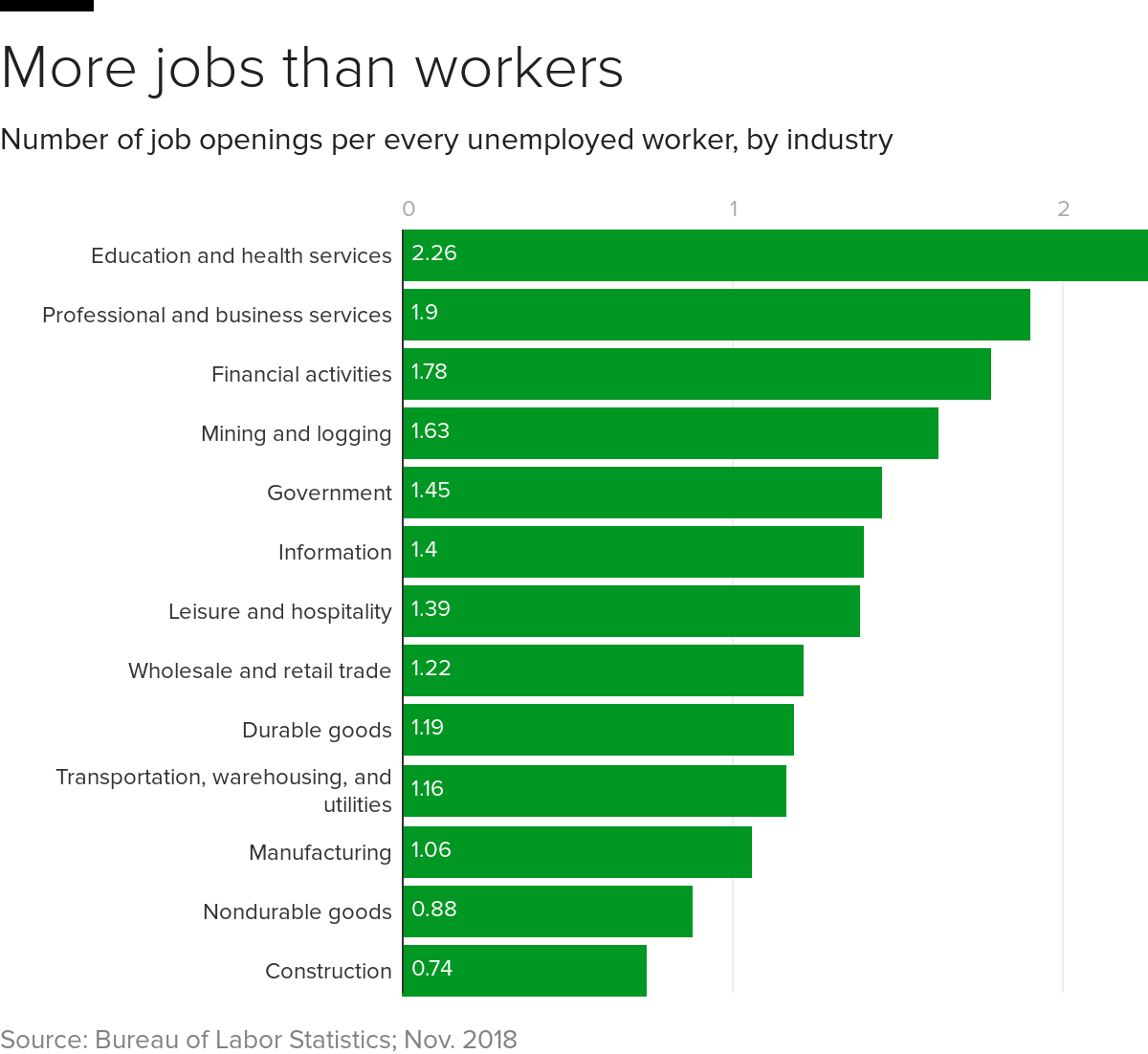These are the industries with the biggest labor shortages
Computer programmers and doctors have rarely had trouble getting hired, even in the depths of the Great Recession. Early in the recovery, it was this type of worker—highly skilled and educated—who benefited most. But in the past year, that's reversed.
As the economy roars ahead, blue-collar and lower-paid industries are having a tough time finding workers. They're raising pay, sweetening perks and even doing away with requirements like drug testing in order to fill their openings. There are now more open jobs than people seeking work in nearly every industry.
"Blue-collar workers are much more likely than a few years ago to have a job, experience rapid wage growth, and be overall satisfied with their jobs," the Conference Board wrote in a recent report. "Populations that typically have a hard time participating in the labor market are now enjoying improved labor market conditions, and there are even signs that the decades-long trend of growing wage inequality is starting to reverse."
Why is this happening? A big reason, they say, is automation has moved slower than predicted. Robots haven't successfully replaced the cashiers, tellers and customer-service reps that interact with customers, and technology to fully automate activities like driving still seems far away.
"Certain occupations that were expected to continue to rapidly decline have proved remarkably resilient and even rebounded," the Conference Board wrote.
Here are the occupations that have rebounded the fastest.
Trucking
Walmart's recent bid to raise its truckers' pay to nearly $90,000 apiece demonstrates the ongoing demand for this job in a transport-hungry economy.
Truck drivers have seen some of the fastest wage growth in the past year. Their pay has increased 7 percent since last year, according to the hiring site Glassdoor—more than three times the rate of the workforce as a whole.
Pundits predict many of these jobs will be automated out of existence, as self-driving vehicles become more common, but in the near future, the industry is facing a worker shortage. Shipping is up, boosted by low oil prices and the boom in e-commerce, while many drivers are retiring.
"It seems like drivers are ground zero for the labor shortages in the U.S.," said Gad Levanon, chief economist for North America at the Conference Board.
The American Trucking Association, an industry group, predicts a shortfall of 175,000 truck drivers within six years.
Retail
Despite the epidemic of department store closings, some retailers are thriving—and finding it harder to hire. Now that workers in this low-paid sector are finding it easier to get other jobs, businesses hiring for retail or customer service positions are increasingly boosting pay and offering perks.
According to Indeed, the job-posting site, the title of "retail sales associate" was the top role where job openings outnumbered resumes. That doesn't necessarily mean there's a shortage, however: businesses could be casting their net too narrowly, said Martha Gimbel, research director of the Indeed hiring lab.
"The number-one title where the resumes outnumber job postings is 'customer service representative,'" Gimbel said. "Presumably, a lot of customer service representatives can do the job of a retail associate. Employers need to think about whether they're looking in the right places."
Cashier jobs saw the fourth-fastest rate of growth last year, with average pay rising to a still-low $28,200, according to Glassdoor. Bank tellers, who use many of the same skills, saw the fastest pay growth—a boost of 8.7 percent, to a median salary of $31,700.
Technology
Jobs in tech already tend to be higher-paying, so it takes a lot of high-wage job growth to show up in the data. Last year, changing requirements among tech companies — with a limited number of workers holding the necessary education and skills, or willing to move to high-cost tech hubs—drove pay to rise twice as fast for some tech jobs as the average.
One of these jobs is Java developer. Median pay for this role that requires knowledge of the programming language Java rose 4.2 percent, to $78,500, according to Glassdoor. Solutions architect—a job that combines technical knowledge with managerial acumen to shepherd large technical projects—saw median pay rise 4.8 percent, to $105,700.
A pay jump isn't the only evidence of worker shortages. "We've heard a lot of anecdotal evidence that employers are starting to reduce qualifications or look for nontraditional workers," said Daniel Zhao, a senior data scientist at Glassdoor. "They might reduce qualifications from a master's to a bachelor's degree, or they might start an apprenticeship."
Health care
The aging of America guarantees a long supply of jobs in this sector—from physicians to orderlies. Especially in rural areas, hospitals and nursing homes are warning about shortages of trained doctors, nurses and home health care workers.
"It's not just doctors--there's a huge support staff behind the industry, nurses, pharmacy technicians. We expect shortages to continue to escalate," Zhao said.
One person's shortage is another person's raise. Pharmacy technicians' pay on Glassdoor has risen 13 percent since 2015, the first year it was tracked. Salaries for emergency medical technicians, licensed practical nurses, nursing assistants and medical technologies have all grown by double digits over the same time period.
"This is negative for employers, but for workers, it's a very positive development," said Levanon, of the Conference Board. "Job satisfaction is going up, labor force participation is going up. We think after several decades of increasing wage inequality we're seeing a reversal."




